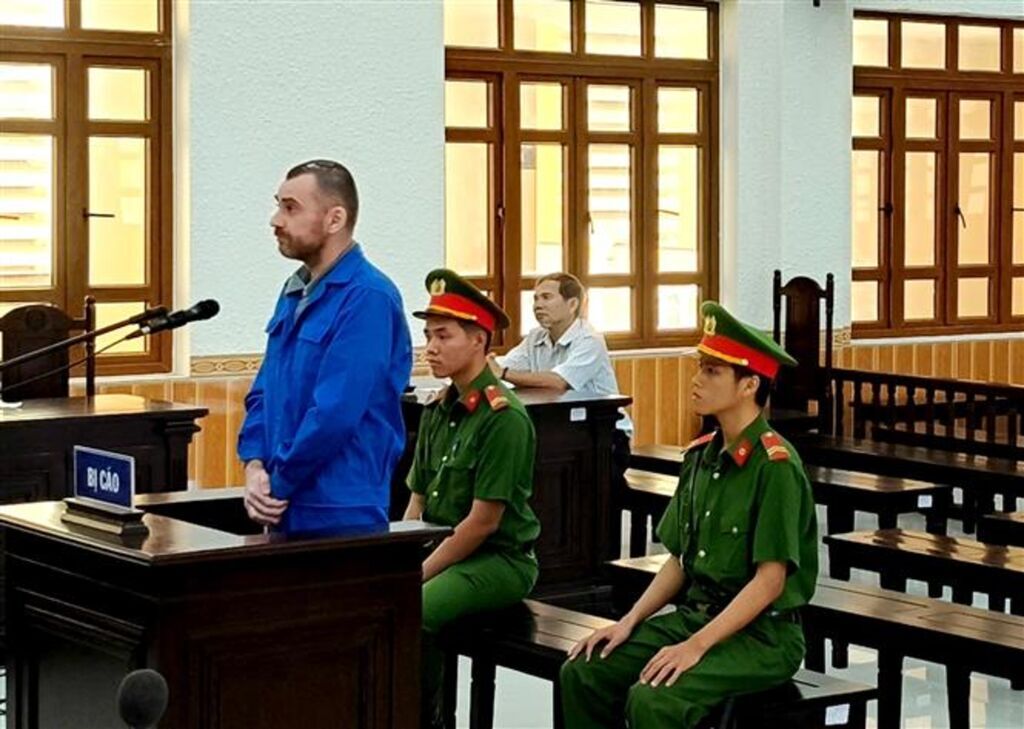 |
| A Russian defendant is tried at a court hearing in Phan Thiet city, Binh Thuan province.__Photo: Nguyen Thanh/VNA |
The Ministry of Public Security has finalized the draft Law on the Transfer of Persons Serving Prison Sentences. The draft, which is expected to be submitted to the National Assembly this week during its ongoing session, aims to improve the legal framework governing the transfer of sentenced persons between Vietnam and foreign countries in a more systematic, feasible, and humane manner.
Jurisdictional competence for transfers
Under the draft, which comprises five chapters with 45 articles, the Ministry of Public Security is designated as the competent authority to initiate transfer requests. Meanwhile. the authority to approve the return of a Vietnamese citizen serving a prison sentence abroad lies with the provincial-level People’s Court of the locality where the individual last registers permanent residence. In cases where the last place of permanent residence cannot be identified, or if the individual has never resided permanently in Vietnam, the Hanoi People’s Court will have jurisdiction.
For a foreign national serving a prison sentence in Vietnam who requests to be transferred to serve the remainder of the sentence in his/her home country, the decision-making authority rests with the People’s Court of the locality where the sentence is being served. In the event of appeals or protests, the relevant high-level People’s Courts will assume review authority. This provision is consistent with the 2024 Law on the Organization of People’s Courts and represents a substantive addition to the existing framework under the Law on Legal Assistance.
Conditions for receipt and transfer
The draft law outlines several conditions that must be met for a transfer to be approved:
- Nationality or residency status: For transfers into Vietnam, the individual must be a Vietnamese citizen. For transfers abroad, the individual must be a citizen, permanent resident, or a person accepted by the receiving country.
- Dual criminality: The offense for which the person is serving a sentence must constitute a criminal offense under both Vietnam’s law and the law of the transferring or receiving country.
- Minimum remaining sentence: At the time of the transfer request, the person must have at least one year remaining on his/her sentence—except in certain special cases as specified by the Government. Notably, the draft law allows for a reduced threshold of six months in special cases involving the repatriation of Vietnamese nationals.
- Finality of judgment: The conviction must be final, with no further avenues for appeal.
- Consent requirement: The transfer must be consented to by the relevant authorities in both countries, as well as the person subject to transfer or his/her lawful representative if such person lacks full legal capacity.
These provisions largely reflect those found in Article 50 of the Law on Legal Assistance. However, the draft law introduces key reforms to facilitate the humanitarian objective of enabling Vietnamese nationals to return home to serve their sentences. In particular, it eliminates the requirement that the individual must have had a permanent residence in Vietnam, thereby aligning domestic law more closely with the terms of treaties to which Vietnam is a party.
According to the Ministry of Public Security, the proposed law aims to systematize and enhance Vietnam’s legal framework governing the transfer of sentenced persons in a way that is “humanitarian, comprehensive, specific, synchronized, unified, feasible, and stable.” The law is also expected to bolster Vietnam’s international legal cooperation and treaty compliance in the field of penal enforcement.
Once enacted, the law will provide a legal basis for Vietnam to carry out its treaty obligations and facilitate the efficient management of prisoner transfers, ultimately contributing to greater legal certainty and international integration.- (VLLF)









